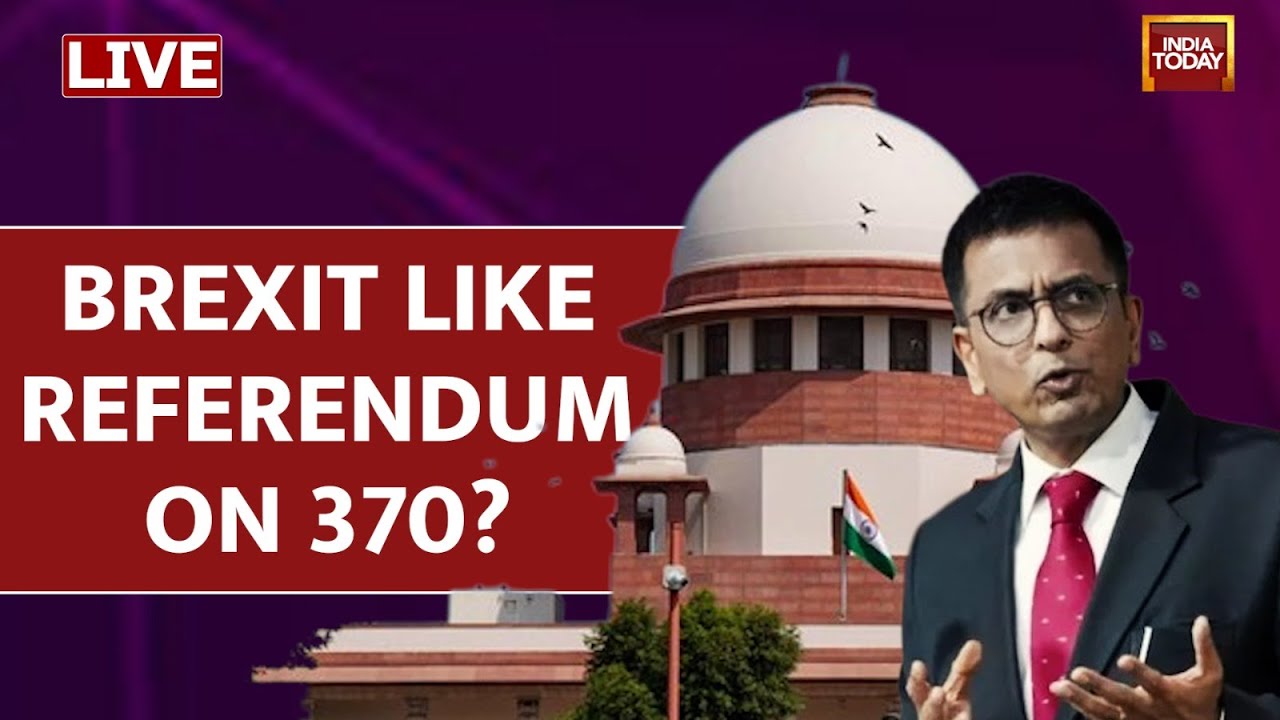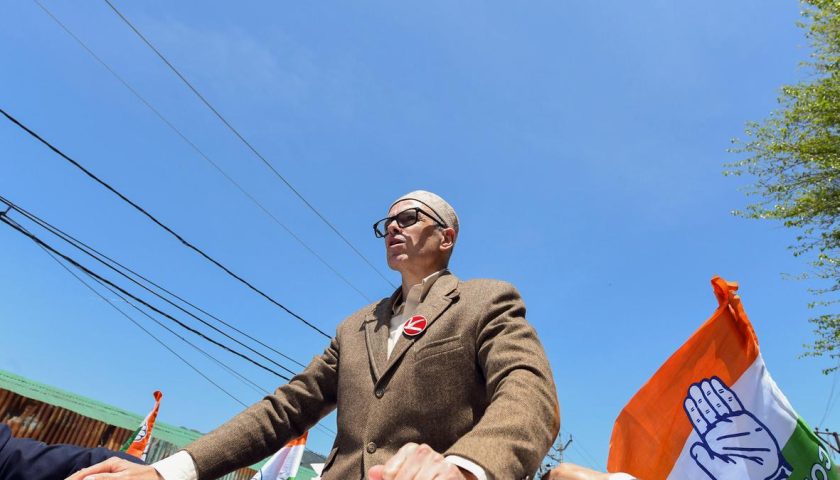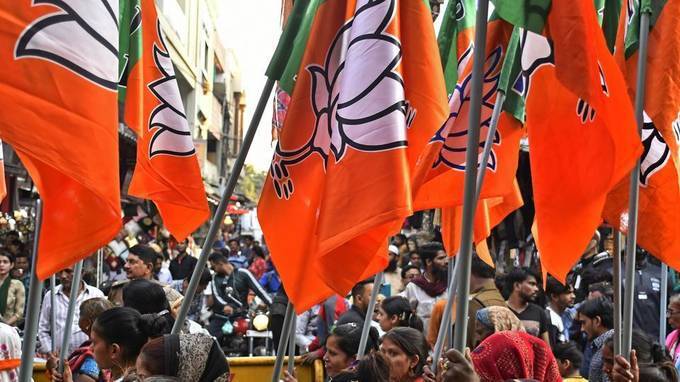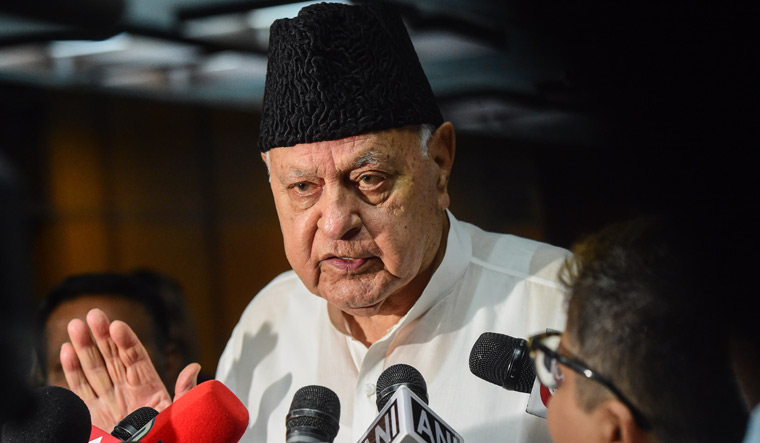A referendum is out of question in a constitutional democracy like India to carry out the decision to abrogate Article 370 and the special status of Jammu & Kashmir, a Constitution bench in the Supreme Court observed on Tuesday, adding that the will of the people in a democracy can be expressed only through established institutions.
On the third day of the arguments in a bundle of matters challenging the August 2019 nullification of Article 370, the bench, headed by Chief Justice of India (CJI) Dhananjaya Y Chandrachud, remained firm that a referendum on the line of Brexit could never be a legally tenable way to go about the nullification of the provision.
“In a constitutional democracy, seeking the opinion of people has to be through established institutions. So long as democracy exists, any recourse of will of people has to be expressed through established institutions under the law and the Constitution,” remarked the bench, which also included justices Sanjay Kishan Kaul, Sanjiv Khanna, BR Gavai and Surya Kant.
The court’s remarks came as senior counsel Kapil Sibal, appearing for National Conference leader Mohammad Akbar Lone, pressed that will of the people had to be in favour of abrogation if Article 370 had to go.
“Your lordships must remember Brexit. What happened? There was no constitutional provision seeking a referendum. But when you want to sever a relationship, you must seek the opinion of the people. Because people are central to the decision,” he added.
Brexit, a portmanteau coined as shorthand for “British exit”, refers to the UK’s withdrawal from the European Union (EU) following a referendum held in June 2016. UK’s withdrawal formally occurred in January 2020.
However, the bench was not impressed with Sibal citing Brexit in the context of Article 370. “Any recourse to will of the people has to be sought through established institutions. You cannot envisage a Brexit type referendum here. That’s a political decision which was taken by the then government. But within the constitutional framework we have, there is no question of a referendum,” it said.
Sibal then went on to contend that the Centre’s exercise of power to abrogate Article 370 was completely unconstitutional, prompting the bench to comment: “Then the question is whether the Constitution does or does not entrust that authority with this power.”
During the hearing, the bench also wondered why the Constitution was not amended in over six decades if the fundamental understanding of the lawmakers was to keep Article 370 and the special status of J&K intact for all times to come.
The court asked the petitioners if speeches made in the J&K Constituent Assembly were enough to grasp the provision as a permanent arrangement between the Dominion of India and the erstwhile Valley State when there was no evidence to show that Parliament made attempts to remove the words “Temporary provisions with respect to the State of Jammu and Kashmir” from Article 370.
“Could Article 370, which was envisaged as a temporary provision, be converted into a permanent provision merely by proceedings of J&K Constituent Assembly? Or was there an act required by the Indian Constitution – either in form of constitutional amendment or something else?” it asked Sibal.
As the senior counsel stressed the point that the debates in the J&K Constituent Assembly showed that J&K chose to accede to India with an understanding that its special status will remain forever, the bench asked what stopped Parliament from amending Article 370 to clarify it was not a temporary provision.
“Even if we accept it for the purpose of hypothesis that it was mentioned as a temporary provision pending the decision of the constituent assembly of J&K, the difficulty is this: Is that submission itself enough to convert Article 370 into an unamendable and untouchable provision? Or did it require something more in the nature of a parliamentary intervention to convert that into a permanent provision?” asked the court.
It emphasised that the third clause in Article 370 provided for the President to nullify the provision following the recommendation of the constituent assembly of the state. “Article 370 provides for a modality through which Article 370 itself would come to an end,” it said.
Referring to the article which empower Parliament to amend the Indian Constitution, the bench added that once the court accepts the proposition that Parliament, as a sovereign body, is capable of amending any part of the Constitution, the exercise of such a power would be subject to criticism on the ground of morality, but not power. “Maybe it’s a political argument that Parliament could not have done it, but it cannot be an argument on the constitutional power,” it said.
Sibal, on his part, make two points as he concluded his submissions on Tuesday. First, he maintained that Article 370 acquired a permanent place after the dissolution of the J&K Constituent Assembly in 1957; and second, that the procedure resorted to by the Centre in abrogating the provisions smacked of political malice and hushing up the voice of the people of the Valley.
The court will continue hearing the case on Wednesday when senior advocate Gopal Subramanium, who represents a J&K resident, will make his arguments in the matter.
A raft of petitions, filed by parliamentarians from the National Conference party, Kashmiri citizens, former bureaucrats and various organisations laid the challenge to the abrogation of Article 370 soon after the presidential order in August 2019.
While some petitioners brought up the requirement of consent from the Constituent Assembly for abrogation of Article 370, others questioned the validity of the President’s rule that was in effect when the abrogation was made. A few of these pleas went back to the Instrument of Accession, while some highlighted the Supreme Court’s ruling of 2018 that observed that Article 370 had gained a status of permanence. Many of these pleas also challenged the Jammu & Kashmir State Reorganisation Act, by which the state was bifurcated into two Union territories with effect from October 30, 2019.
On August 28, 2019, the Supreme Court issued notices on the pleas despite resistance from the central government, which argued that Article 370 had international and cross-border implications.
On July 3, the Supreme Court notified the setting up of a new Constitution bench, comprising its first five judges. A week later, the new bench directed that day-to-day hearing in the case would begin from August 2.






